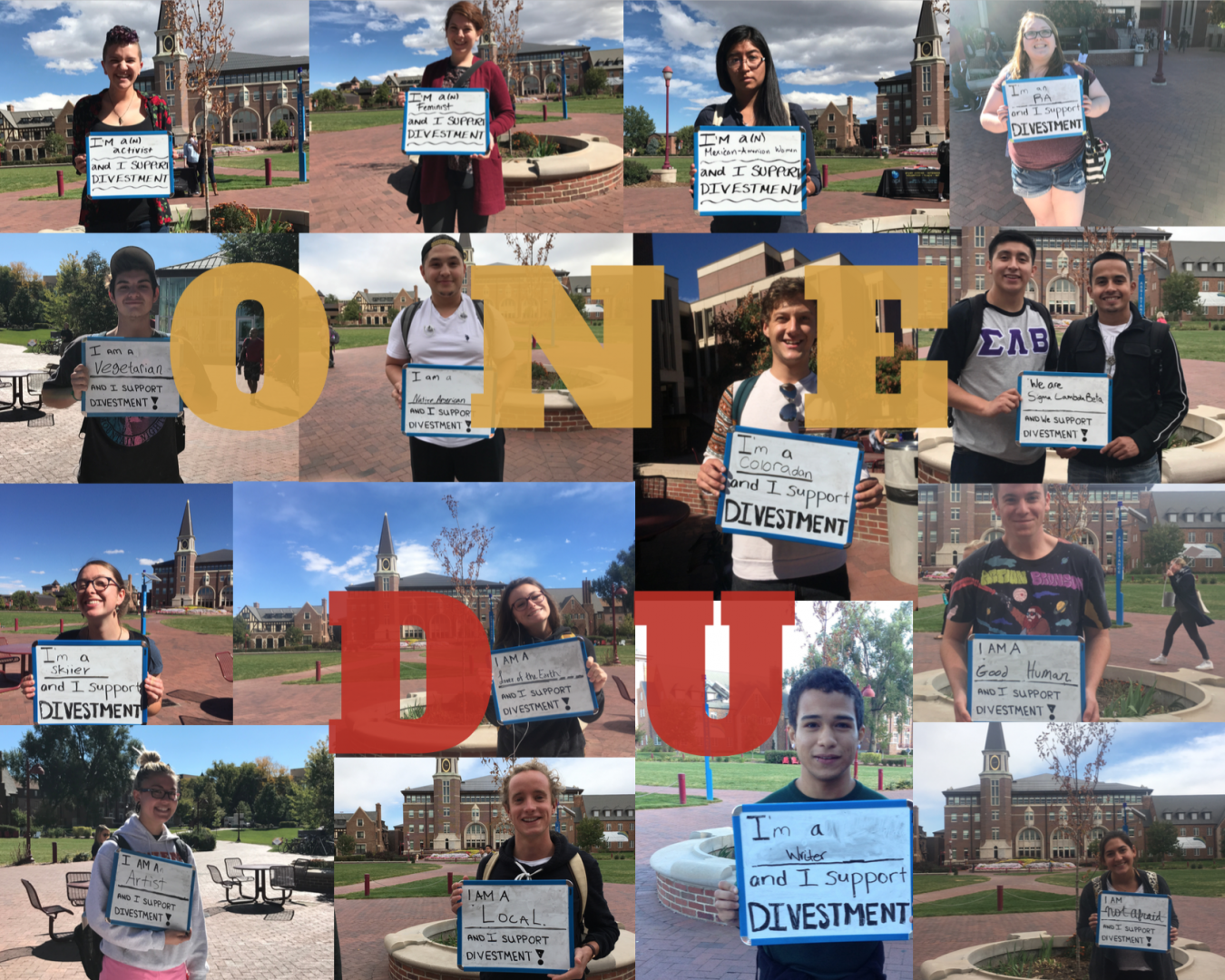The University of Denver has held multiple hearings to consider divesting the university endowment from fossil fuel companies. Because this decision is a big deal, the Divestment task force of the Board of Trustees has created an online portfolio containing videos of each hearing and extensive reading materials available to anyone. If you would like to catch up on the information that was presented, you can find it there.
Divestment came on the university’s radar three years ago when a group of students established Divest DU. Outstanding student and faculty support of divestment resulted in the Board of Trustees inviting students of Divest DU to present their case at a full board meeting in April of 2016. Following this presentation, the Board of Trustees decided to form a special task force who would consider divestment. This task force was not a demand of Divest DU.
Divest DU is an environmental activist group at its core, however “divestment” describes a strategy that aims to cause social and political change by divesting resources from harmful industries and creating a political climate in which action is no longer just an option but necessary. In recent history, divesting has been successful in putting a check on the tobacco industry as well as ending South African apartheid. Today’s divestment campaigns are motivated by the impending climate crisis and target the fossil fuel industry in order to inspire political change surrounding global warming. Although both fight against the fossil fuel industry, Divest DU is in not a subsidiary of the organization 350.org and recieves no funding from them.
Considering the facts, divesting from fossil fuels is both an economically and socially responsible course of action for the University of Denver. The recent downfall of the coal industry devastated many investors and could very well reflect the economic future of oil and gas in a society that is moving towards renewables and more efficient technology. Investments in fossil fuels are actually quite risky compared to the norm because fuel prices change very dramatically due to non-economic factors, such as political conflict. According to The Guardian, the Bill and Melinda Gates Foundation, which is the world’s largest private foundation, stated earlier this year that they would have been $1.9 billion better off if they had divested from fossil fuels sooner. It is very likely that the university’s endowment portfolio would benefit from divestment in the long term and would therefore be able to provide a greater amount of scholarships, fellowships and programs to future generations of students.
The DU’s vision statement is “a private university dedicated to the public good.” Considering the current climate crisis, divestment from the fossil fuel industry is absolutely necessary for the university to honor this vision. The burning of fossil fuels has raised the average temperature of Earth by 1.35 degrees Celsius already, and the consequences of this warming have manifested in disappearing ice sheets and extremely irregular weather patterns, such as the California drought. Studies show that burning only our current reserves of coal, oil and gas would put us well beyond two degrees Celsius of warming, which is the threshold set by scientists for irreversible damage to Earth’s systems.
In 2015, governments from all over the world met in Paris to discuss and decide on policies that would prevent the Earth from surpassing two degrees Celsius of warming. However, the pact was not legally binding, therefore, many countries (including our own) have not met the goals that were set to curb global warming. Even when the whole world is at stake, our government has refused to cut ties with the fossil fuel industry in order to change policies, which is where divestment campaigns are hoping to fill the political gap.
Furthermore, while we understand fear surrounding the issue of scholarships, we believe it is not economically, environmentally or socially responsible to base funding our education on the oppression of people and destruction of our planet. Fossil fuels are stranded assets. There are far more reserves than we are able to use due to the negative impact they have had and continue to have on our environment. Even if we burned all of the already established reserves of coal, oil and gas, we would still reach two degrees Celsius of warming. Investing in the fossil fuel industry therefore does not make economic sense because the product itself is destroying its own profitability. The return on investment is an increasingly dangerous planet to live on.
Finally, when we pride ourselves on being a socially responsible institution we cannot look solely at our students, we must look at the world beyond the DU bubble. Climate change is causing immense suffering all over the world and particularly in the Global South from temperatures reaching more than 120 degrees in India this summer to over 800 people dying in Haiti just weeks ago at the hands of Hurricane Matthew. DU is socially responsible for divesting from one of the primary drivers of global warming. Plus, the profitability of clean and renewable efforts has increased and, as humans realize we must transition away from fossil fuels in order to survive, we will continue to do so.
Over 50,000 organizations have committed to divesting $3.4 trillion from fossil fuels. As a highly esteemed institution, divesting our funds from the fossil fuel industry makes an important political statement that the University of Denver will not stand for the destruction of the planet or the oppression of its peoples.










